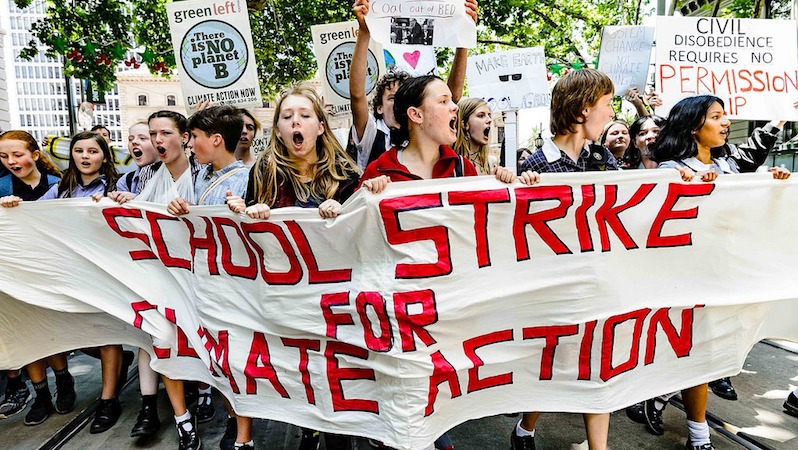Dear ministers of the G7 environment meeting,
We are writing to you not just as a group of young climate activists fighting for our future, but as citizens fighting for the well-being of our countries. Our future is currently uncertain because of our leaders’ constant need for economic growth at the expense of our environment.
The UN and IPCC reports are clear: we must change if we want to stop destroying our planet. However, nothing is changing. We, the young people, are ignored, and forgotten.
This is why we are addressing you. The G7 countries are some of the biggest contributors to climate change and are the most influential on the international scale, and yet they do little to slow it down. We demand that this crisis is treated as one. There is no time left for endless discussions anymore. The clock is ticking, the water is rising, and the people are dying.
School climate strikes go global, with actions planned in 92 countries
Arctic Canada is currently warming at three times the global speed: temperature has already risen by more than two degrees causing permafrost melt, impacts of which include homes sinking into the ground, food insecurity as hunting is more dangerous, and starving animals such as polar bears. Climate change is a violation of the Inuit’s rights as indigenous people under UNDRIP: it will result in the extinction of their culture as it is shaped around their
environment. Inuit activists such as Sheila-Watt Cloutier have been pleading for help for decades, but their voices are still not being heard.
In Japan, record rains in July 2018 caused floods and landslides that killed about 200 people, followed by unimaginable heat waves which threatened the vulnerable elderly population. The flooding of the Kansai airport by typhoon Jebi has reminded Japan of how vulnerable an island country is to climate change. If the climate keeps getting worse, abnormal weather patterns will occur more regularly. Japan’s future can only be foreseen with even more
suffering.
Despite such obvious signs from nature, Japan has not put enough effort in combating climate change. Japan is the only G7 country still planning new coal-fired stations and since the Paris Agreement, Japanese megabanks poured $186 Billion into fossil fuels. These megabanks are an army of delayers who refuse to change and think only about profit, but their profit comes with the cost of the generation after them- us.
However, the consequences of climate change are not only visible in the G7 countries. The recurrent droughts in Africa are causing a lot of harm as well, even though most of the African countries produce a very low amount of carbon emissions.
Global issues need global coverage
CHN is dedicated to bringing you the best climate reporting from around the world. It’s a huge job and we need your help.
Through our Patreon account you can give as little or as much as you like to support our work. It’s safe and easy to sign up.
Why are they the ones suffering the consequences of our occidental way of living which has caused so much harm to
our planet? Furthermore, the disasters happening in developing countries will impact the G7 countries. If no action is taken, there could be around 143 million climate refugees soon, seeking shelter in countries that are less endangered.
This is why you must fulfil your responsibilities as decision-makers for seven of the most powerful countries in the world. You must have bolder emission reduction targets than the IPCC global average: 45% by 2030, net zero by 2050. You must become an example to developing countries and support them financially and physically, so that they do not repeat the same mistakes we made and are now suffering the consequences of.
We are begging you to take immediate action, so that children everywhere in the world can have a future.
Sincerely,
Student climate strikers:
Rebecca Hamilton-Miriam, Maya Mersereau-Liem, Payton Mitchell (Canada)
Isra Hirsi, Maddy Fernands (US)
Greta Stripp, Elsa Quillaud, Nahia Briault, Mael Blin (France)
Kim Tran (Japan)
Sammy Céline, Luca Salis, Jan Ole Lindner, Carla Reemtsma, Jakob Blasel, Luisa Neubauer, Franziska
Wessel (Germany)
David Wicker (Italy)
Anna Taylor (UK)
Source: Climate Home News





